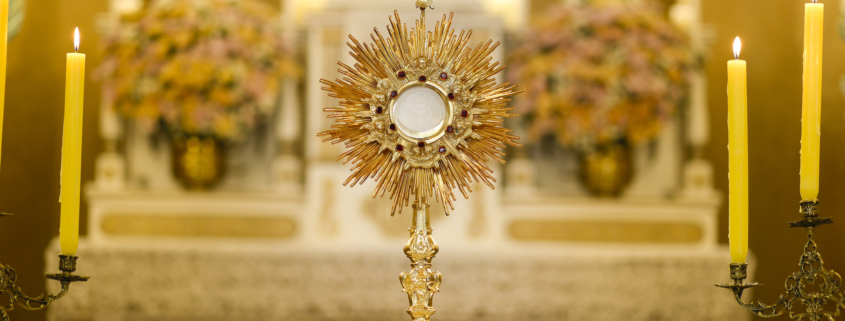College-Bound Student Desires Holy Eucharist at ‘Center of Campus Life’

Sarah Davis
Editor’s Note: The Cardinal Newman Society recently announced that Sarah Davis, a homeschooled student in Pennsylvania, is the winner of the Society’s 2022 Essay Scholarship Contest for Catholic college-bound students. Davis will receive a $5,000 scholarship toward her education at Christendom College in Front Royal, Va., this fall. Below is the full text of her winning essay. More information about the Contest can be obtained here, and students who want to be eligible for next year’s Contest can sign up for Recruit Me here.
For the past eight years, my family has been blessed to live across the street from our parish. This proximity to Jesus in the Eucharist has had a strong influence on my upbringing. Daily Mass, personal prayer in front of the Blessed Sacrament, and monthly Adoration have been non-negotiable family practices which have laid a strong spiritual foundation. Now that I am preparing to leave home for college, I wish to attend a college which will help me to maintain and augment this foundation rather than having to struggle to keep it. I am convinced that a faithful Catholic college which is strongly devoted to the Eucharist will uniquely and positively impact my religious, moral, intellectual, and social formation.
First, attending a college which keeps our Eucharistic Lord at the center of campus life will bolster both my religious and moral formation. A college which loves the Eucharist treasures the Holy Sacrifice of the Mass as the high point of the day and provides ample opportunities for Eucharistic Adoration. It will not be a struggle, therefore, to enshrine Mass and Adoration as the center of my own life while my personal relationship with Jesus is fostered through these daily encounters. Moreover, pouring forth from this cherished time with Jesus will be the grace to live a virtuous life. In front of the Blessed Sacrament, I will find the strength to conscientiously perform my duties as a student, treat others with true charity, and keep fighting for sanctity. If our Eucharistic Lord reigns over the college which I attend, I will be challenged to let Him reign over my own heart and life.
A college-wide devotion to the Eucharist will also strengthen my intellectual and social formation. While adoring Our Lord in Mass and Adoration, I will be reminded that the ultimate goal of my studies is a deeper knowledge of God, whether that is attained directly through the study of theology or indirectly through such disciplines as philosophy, literature, and science. Therefore, as I ponder before the Blessed Sacrament the truths I am grappling with in class, I will be led into a deeper relationship with Truth Himself, present in the Eucharist. Moreover, worshipping the Eucharist with my peers will help foster authentic, Christ-centered community which is rightly oriented toward the glory of God and our common pursuit of holiness. In front of our Eucharistic Lord, I will also be able to pray for my classmates and learn from Christ how to love them in a truly Christian way. A college devoted to the Eucharist, therefore, will help me to place Christ at the center of both my studies and my relationships.
Thus, just as devotion to the Eucharist has been integral in my formation growing up, it is also a non-negotiable factor when considering college options. A college which has a deep love for our Eucharistic Lord will enable me to continue placing God at the center of my life, grow in knowledge of the truth, and develop authentic relationships, ultimately leading me to a deeper relationship with Jesus Christ. Therefore, no matter what God asks of me after college, I can be assured that this devotion to the Eucharist, nurtured during college, will be my strong foundation as I continue to grow into the woman God has created me to be.

